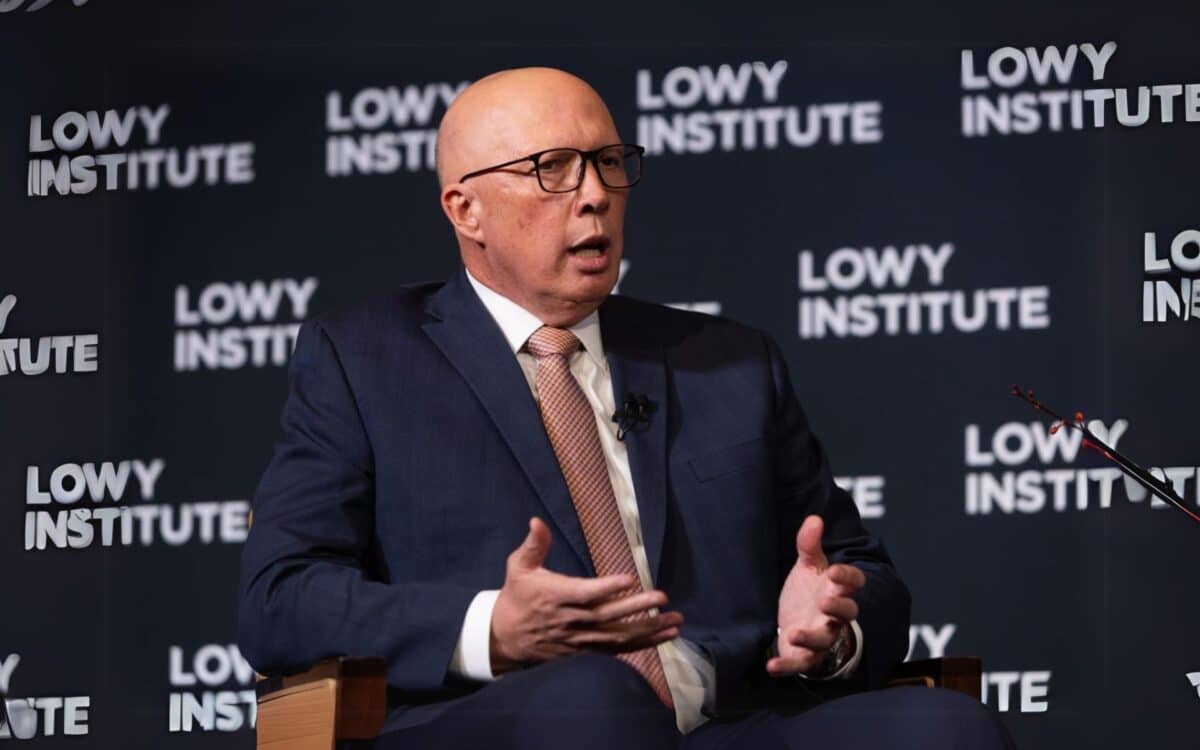Opposition Leader Peter Dutton has unveiled a significant policy shift, vowing that a Coalition government would increase Australia’s defense spending to 2.5% of GDP within five years and 3% within a decade.
This commitment marks a considerable jump from the current level of about 2% of GDP, with defense spending slated to rise to 2.3% by 2033-34 under the current government’s projections.
Dutton argues that such an increase is essential to address rising global threats and ensure Australia’s security in an uncertain international environment.
According to The Conversation, these defense spending proposals are aimed at strengthening Australia’s military capabilities to counter emerging geopolitical challenges.
A Commitment to Increased Funding
Dutton’s proposal includes a pledge to invest more than $21 billion in defense over the next five years to reach the 2.5% of GDP target. This commitment would mark a dramatic rise in Australia’s defense budget, a significant contrast to the current trajectory.
Australia’s defense spending is set to rise to 2.3% of GDP by 2033-34, but Dutton argues this increase is insufficient to address the rising global security challenges.
The opposition claims that its plan for a 2.5% GDP defense spending target is “significantly higher than under Labor” and demonstrates the Coalition’s commitment to keeping Australia safe in uncertain times.
The Strategic Context
Dutton’s announcement is framed within a broader global context. With concerns over China’s growing influence in the Indo-Pacific region, Dutton insists that stronger defense capabilities are essential.
His proposal aligns with global defense expectations, particularly from the Trump administration, which has called for allied nations to increase defense spending to 3% of GDP.
In this context, Elbridge Colby, former under-secretary of defense for policy under Trump, stressed that Australia’s defense spending was well below the NATO Secretary General’s recommended 3%, particularly given the strategic threat posed by China.
Dutton added that the rise of authoritarian powers and ongoing global conflicts, such as in Europe and the Middle East, highlight the urgency of strengthening Australia’s defense forces.
A Shift in National Defense Priorities
The Coalition’s proposal has faced scrutiny, particularly regarding the lack of detailed plans for how the funding would be allocated or financed. Critics, including Labor’s Defense Minister Richard Marles, have demanded more clarity.
He has stated that
It won’t cut it to have vague numbers, to have aspirations, to have signposts in the future
and that any defense policy should include specific plans on funding and resource allocation.
In its statement, the opposition also accused Labor of overseeing
More than $80 billion in cuts and delays to defense in just three years, degrading morale and capability, and putting Australia at risk.
The Coalition contends that under Labor, defense spending has stagnated, weakening the nation’s preparedness. Dutton and his colleagues argue that these cuts have undermined Australia’s defense strength, leaving the nation vulnerable.
Labor’s Response and Criticisms
While the Coalition has pushed for substantial increases in defense spending, Labor maintains that it has already implemented the biggest peacetime increase in defense spending that Australia has seen in recent years.
According to Marles, Labor’s approach has involved steady increases in funding based on Australia’s evolving defense needs, with defense spending projected to rise to 2.3% of GDP by 2033-34.
Marles also reiterated,
We’ll continue to look at what the appropriate levels of defense spending are. Increases in defense spending will happen under this government, because that is, in fact, what we’ve done over the last three years.
The defense policy debate will be a key issue in the lead-up to the 2025 federal election, with both parties positioning themselves as the best choice to secure Australia’s future. Dutton and Shadow Defense Minister Andrew Hastie argue that under a Coalition government, there will be
Clarity around the risks we face and a strategy to deter them.
They stress that the investment in defense is ultimately an investment in peace, underpinned by a strong army, navy, air force, and enhanced cybersecurity.
Dutton added,
The Prime Minister and the Deputy Prime Minister regularly tell Australians that we live in the most precarious period since the end of the Second World War. Yet, over the last three years, Labor has done nothing about it, other than rip money out of Defense, weakening strength and morale.









